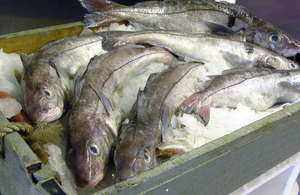UK secures fair fisheries deal in Europe
Deal strikes the right balance between supporting business and conserving fish stocks.

Fish
The UK government has delivered a fair deal for fishermen today, striking the right balance between supporting businesses and conserving fish stocks to safeguard the future livelihoods of our fishing fleets and their local communities.
This follows negotiations at the annual EU Fisheries and Agriculture Council where fishing quotas for 2015 were agreed. Decisions were based on three clear principles: following the available scientific advice; achieving sustainable levels of fishing; and reducing discards.
The government entered negotiations facing challenging proposals from the Commission for precautionary reductions in the quotas of many stocks, but important increases were agreed for many parts of the UK’s fishing fleet. This includes increases to cod and haddock in the North Sea, Nephrops (prawns) in the Celtic Sea, sole in the Western Channel and angler (monkfish) and haddock in the West of Scotland.
Where the latest scientific evidence supported it, we were also able to lobby against unjustifiable cuts proposed by the Commission. Instead we ensured quotas were looked at on a case-by-case basis, achieving a rollover of current 2014 catch levels to provide stability for the fishermen who rely on these species, including skates and rays around the UK.
The government also successfully resisted further reductions to days at sea under the cod recovery plan. This will give fishermen the time they need to fish more selectively and avoid discarding perfectly good fish.
Finally, despite pressing hard for measures to address declining sea bass levels we were disappointed not to leave negotiations with an agreement on specific measures to tackle this issue. The UK government has led on action to improve these stocks and has now secured a commitment from the Commission to work with Member States to reduce fishing pressure at the start of the season in 2015.
Commenting from Brussels UK Fisheries Minister George Eustice said:
Although these were difficult negotiations, I am pleased that we were able to secure the best possible deal to ensure sustainable fisheries and a strong UK fishing industry.
While fishermen had feared there would be major cuts from the Commission, by bringing new science to the table we were able to keep the same quota as last year for many species, including monkfish, megrim and pollock in the South West and skates and rays around the UK. This was in addition to important increases to North Sea cod and haddock quota which will benefit Scottish fishermen.
In some cases there are still some reductions in quota, but I entered these discussions with the firm belief that any decisions need to support our shared goals of a thriving fishing industry, sustainable fish stocks and a healthy marine environment. If we want a long-term future for our industry we have to listen to the available science and agree fishing opportunities which support the sustainability of our stocks.
I was disappointed no decision was reached this year to improve bass stocks but will be following up on the Commission’s commitment to work with Member States in the New Year. The UK has been a lone voice on this issue and it is essential we achieve a balanced approach which reflects the contribution of both commercial fisheries as well as recreational anglers on declining bass numbers.
Given the start of the pelagic discard ban in January 2015 the UK also ensured next year’s total allowable catch took into account the ban on discarding fish, a crucial agreement following UK-led reforms to the Common Fisheries Policy last year. In addition a commitment was obtained from the Commission to undertake research to improve flexibility, allowing fishermen to use quota across regions in light of the discard ban and increased selectivity.
The UK also successfully negotiated a number of further concessions. These include:
-
Days at sea kept at 2014 levels rather than reduced.
-
Increased quota for fishermen in many areas, including the following:
- North Sea: 5% cod,15% Nephrops (prawns), 15% plaice
- North Sea and West Scotland : 6% haddock, 20% angler (monkfish)
- Irish Sea: Nephrops (prawns) 3%
- Around the UK: hake 11%
- Reducing cuts to a number of important fish quotas by providing sound scientific evidence to the Council. Including:
- Celtic Sea: 64% cut to cod reduced to 26% and 41% cut to haddock reduced to 12%
- Eastern Channel: 60% cut to sole reduced to 28%
- Bristol Channel: 35% cut to sole reduced to 15%
- As well as maintaining 2014 quotas for a number of stocks, including:
- Irish Sea: haddock
- South West: angler (monkfish), megrim
- Bristol Channel: plaice
- North Sea: megrim, dab and flounder, sole and ling
- And accepting proposals for cuts where necessary to protect stocks, including:
- Celtic Sea: 30% cut to herring, 26% cut to cod and 12%
- North Sea: 5% herring, 15% saithe.
The Fisheries Minister George Eustice represented the UK in Brussels to ensure a package of measures that reflected the interests of all parts of the country. Richard Lochhead and Michelle O’Neill also attended for Scotland and Northern Ireland, respectively.
The negotiations were the culmination of months of UK government-led meetings to hear from fishermen, devolved administrations, scientists and environmental NGOs to secure the best possible deal in order to meet our shared goals of a thriving fishing industry, sustainable fish stocks and a healthy marine environment.
Fishermen in the North East and Scotland also benefitted from the formal acceptance of our early agreements with Norway on fishing opportunities in the North Sea where we secured a quota rise in haddock and cod – the second successive rise in two years. Negotiations with the Faroe Islands to deliver additional quota and opportunities to catch a number of species in Faroese waters were also agreed at Council today.